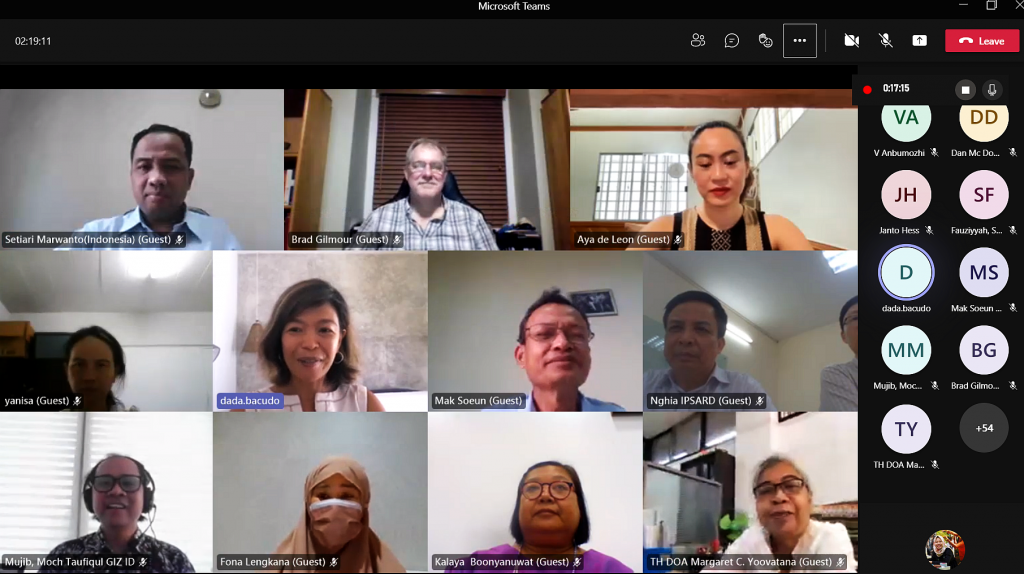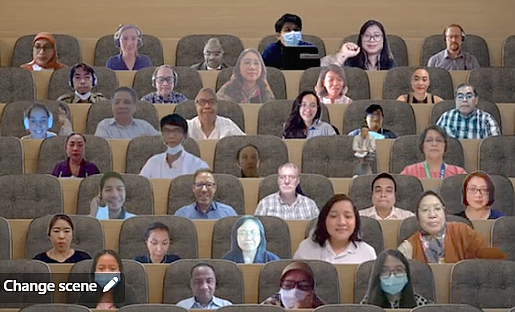With specific regard to the agriculture sector, there are clear links between the impacts of and responses to the COVID-19 pandemic on the one hand and the challenges of dealing with climate change on the other. This assumption was the starting point for discussion during the Virtual Dialogue of the ASEAN Climate Resilience Network (ASEAN-CRN) held on 8 June 2021 under the heading ‘Exploring the nexus of climate change, food security and the COVID-19 pandemic’.
Around 70 participants attended the event and shared the insights of Member States of the Association of Southeast Asian Nations (ASEAN) into the challenges created by the pandemic and climate change as they affect the agriculture sector and food systems. The purpose of the event was to increase understanding of the potential convergence between climate-smart approaches to land use and COVID-19 recovery strategies in Southeast Asia in order to improve food security and reach climate goals. The insights gained at the event will inform knowledge exchange and policy processes at national and regional level.
ASEAN Policy Framework
The event was hosted by Viet Nam through the Institute for Policy and Strategy for Agriculture and Rural Development (IPSARD) and ASEAN-CRN. During their opening remarks, Dr Thang (on behalf of IPSARD) and Dr Margaret Yoovatana (on behalf of Thailand as Chair of ASEAN-CRN) drew attention to the ASEAN Comprehensive Recovery Framework (ACRF) and underscored the need to act upon the priorities as agreed by ASEAN Member States. Together, the ACRF and the corresponding implementation plan form a consolidated strategy for addressing the COVID-19 pandemic in the region and highlight the role of climate-smart agriculture.
Dr Yoovatana also reminded participants about ASEAN’s regional guidelines on land-use sectors as a key reference for policy-makers. She underlined the importance of implementing the guidelines, for example by scaling up and scaling out best practices in the agriculture sector.
Policy brief ‘Double impact: COVID-19 and climate change in the food and agriculture sector’
Discussions at the virtual event centred on the policy brief Double impact: COVID-19 and climate change in the food and agriculture sector, which was circulated together with the invitation. The paper was prepared by the Climate Smart Land Use (CSLU) in ASEAN project in cooperation with the Climate and Clean Air Coalition (CCAC).
Mr Dan McDougall of the CCAC gave an overview of the pandemic’s impacts on food systems in the short and long term and explained how they relate to climate change impacts and action. His presentation discussed the importance of integrating climate actions and investments into COVID-19 recovery strategies for the food, agriculture and forestry sectors. Among other recommendations for regional and national policy-makers, he highlighted the potential to develop a green recovery plan for the agriculture sector based on the three inter-related concepts of population health, economic and social health and environmental health. Mr McDougall shared the view that countries should strive to align their COVID-19 responses with existing policy frameworks that promote resilient and climate-friendly agriculture, for example NDC implementation plans or long-term low-emission development strategies.
Dr Venkatachalam Anbumozhi of the Economic Research Institute for ASEAN and East Asia (ERIA) and Dr Janto Hess of the United Nations Development Programme (UNDP) shared their insights in response to the circulated policy brief. Dr Anbumozhi informed participants about ERIA’s work examining the impact of COVID-19 on agricultural supply chains and promoting digitalisation within the agriculture sector throughout the ASEAN region. He also reflected on ASEAN’s response to other crises in the past. Dr Janto Hess offered a number of recommendations to improve some aspects of the policy brief.
Both speakers contrasted the challenges posed by the pandemic with the unique opportunity for innovative thinking to ‘build back better’ and advance more climate-friendly and resilient agricultural practices across the region. They recommended action to promote the integration of digital technology into agricultural supply chains and to align existing policies and plans with changing realities and needs on the ground.
Insights from Member States
Viet Nam, through IPSARD, shared the country’s responses to the impact of COVID-19 on the agriculture sector. Some of these strategies include diversifying production, harnessing new marketing channels, improving access to information on markets and demand, and promoting the use of digital technology. This was followed by contributions from other countries such as Cambodia, Malaysia, Thailand and Indonesia outlining their own experience in this area.
Next, working in small groups, the participants explored potentially more effective approaches to combining COVID-19 responses with climate action in the agriculture sector and identified a broad range of areas for further engagement. These include highlighting the need to break down existing silos in policy-making, developing plans for both short- and long-term action and mobilising funding from various sources. The list of key mechanisms identified by participants for advancing a green recovery in agriculture included digital technologies, better access to data, agricultural insurance, pest and disease management, reforestation and agroforestry.
The virtual event was designed to support the implementation of the ACRF and facilitate the sharing of knowledge on climate-smart agriculture and food systems through ASEAN-CRN. It was supported by the Climate-Smart Land Use (CSLU) in ASEAN project, which is implemented by the Deutsche Gesellschaft für Internationale Zusammenarbeit (GIZ) GmbH with funding from the German Federal Ministry for Economic Cooperation and Development, in cooperation with the Climate & Clean Air Coalition (CCAC).
Based on the results of the event, GIZ and CCAC will revise the original policy on this topic and disseminate the final version to a broader audience.
The event documentation will be available at :
Exploring the nexus of climate change, food security and the COVID-19 pandemic, June 2021.
Study and Policy
Double Impact: Covid-19 and Climate Change in Food and Agriculture
Perspective: How can ASEAN ensure an equitable, food-secure and climate-smart recovery from the Covid-19 pandemic?

